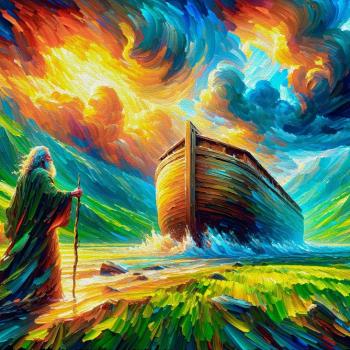In order to be reconciled with church traditions, evangelicals would do well to cease viewing the history of the church as a regrettable tale of perpetual decline and accommodation to the world. The oscillation of decline and renewal seems to be a permanent feature of the church, for she is comprised of sinners, and yet God in Jesus Christ has been and will remain faithful to her. Evangelicals are deeply committed to history as a discipline. We have fought vigorously in defense of the historical veracity of the New Testament and especially the Resurrection accounts. The life of the church after Christ, however, also has lessons to teach evangelicals -- if we will have the ears to hear them.
Which is simply to say that evangelicals should complement our reading of Calvin -- and even Calvin is not read as frequently or deeply as he ought to be -- with charitable and yet critical readings of Augustine and Thomas Aquinas, Boethius and Bernard of Clairvaux (one of Calvin's favorite theologians), in order to gain a deeper understanding of church history and find more precise ways of articulating the truths of scripture. We can delight not only in our freedom from a tradition that is sometimes decadent, but in our freedom to recover the gold and jewels that have been lost or buried along the winding path that believers have walked from the resurrection of Christ to the present day.
The evangelical world is deeply, tragically flawed. Its vices and abuses are well documented, and questions surrounding its long-term viability are many and grave. But before the book on evangelicalism is closed, it's worth noticing the signs of hope that are among us.
Finally, a word of caution. It is tempting, amidst all the theorizing about where evangelicals are going and how they will get there, to chart out grand cultural strategies. The recovery of tradition, however, is just another means toward the goal of a deeper knowledge of Jesus Christ, who is the end of history and the foundation of our faith. As J. I. Packer put it so eloquently at the end of Knowing God:
We have been brought to the point where we both can and must get our life's priorities straight. From current Christian publications you might think that the most vital issue for any real or would-be Christian in the world today is church union, or social witness, or dialogue with other Christians and other faiths, or refuting this or that -ism, or developing a Christian philosophy and culture, or what have you. But our line of study makes the present day concentration on these things look like a gigantic conspiracy of misdirection. Of course, it is not that; the issues themselves are real and must be dealt with in their place. But it is tragic that, in paying attention to them, so many in our day seem to have been distracted from what was, and is, and always will be, the true priority for every human being. That is, learning to know God in Christ.
It is a message that evangelicals must not forget. Lest the emphasis on recovering church tradition become another "gigantic conspiracy of misdirection," evangelicals must remember and must appropriate tradition selectively in light of the truth, so that the ultimate purpose of our liturgies and calendars and embodied practices is to plunge more deeply into "the surpassing greatness of knowing Christ Jesus," and thus "gain Christ and be found in him" (Phil 3:8).
Matthew Anderson is a the author of Earthen Vessels: Breathing New Life into a
Broken Faith (forthcoming from Bethany House) and is the Lead Writer for Mere Orthodoxy and a Senior Editor for Evangelical Outpost. He has been quoted in Christianity Today, the Wall Street Journal, and the Associated Press. He is a Perpetual Member of the Torrey Honors Institute, and just celebrated five years of marriage to his lovely wife Charity. You can follow him on Twitter or on Facebook.




